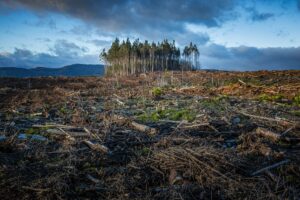Humanist Ecology and Climate Disinformation
 Photo by Matt Palmer on Unsplash
Photo by Matt Palmer on Unsplash This month the American Humanist Association (AHA) is focusing on a theme of “Humanist Ecology and Climate Disinformation”. We invite you to think and learn about how disinformation and misinformation have contributed to the current state of our biosphere, our relationship to other sentient beings, and to ourselves. Awash in the complexity and nuance of it all is climate anxiety, ecological grief, and the urgency of now.
When I first began what I now call my life’s work, I did not know what climate disinformation was. Over the course of the last five years, I’ve investigated and uncovered the impact of the fossil fuel industry upon institutions of education. With each new egregious discovery I would experience a kind of panic-laced dread about the state of our climate. I have a distinct memory of learning that the Trump Administration adopted climate deregulation recommendations from George Washington University’s Regulatory Studies Center, a deeply biased anti-regulation group masquerading as a scholarly research organization. As a result of the decades-long campaign waged by Big Fossil Fuel, their lobbyists, and fossil fuel banks, climate disinformation is everywhere. The feeling of that day still lingers in my mind. I felt so powerless and experienced palpable fear. I understood how consumer-based cultural norms of individuals were already pushing our planet to the brink. If our most prestigious institutions were in on it…how could anything change?! After reading the reports I walked around my house ruminating on overpopulation, ocean plastic, and what we are doing to the animals that inhabit our planet. I imagined my young children without water, navigating a crisis one day after my death.
Dr. Lise Van Susteren, a general and forensic psychiatrist in Washington, might describe what I experienced that day as the “psychological effects of climate change”. According to her website, “Van Susteren is the expert witness on the psychological damages to young people from inaction on climate in Juliana v US Government, in Held v Montana and in the European Court of Human Rights.” Van Susteren’s work also has an indigenous framework: ecological grief.
Some claim that the Anthropocene (the period of time since humans have had a significant impact on our planet) is a part of the condition of our young species. Native elders and humanist revolutionaries have provided roadmaps that present a counter-story to the politics of inevitability. One such route on the roadmap of hope emerges from Indigenous epistemologies. “Be a good relative” is a practice and tradition I was taught by my elders. It is a call to be responsible for people, plants, and animals. It rejects the norms of extraction and subjugation within colonialism and industrialization and connects to what Aldo Leopold termed “land ethic”. As our society reckons with the urgency of now, it is my hope that present-day technologies can support the implementation of indigenous traditions that can ensure a liveable climate for all. It is this commitment to collective responsibility and care where I find space to soothe my climate anxiety and express my ecological grief.
